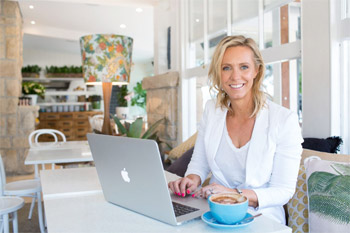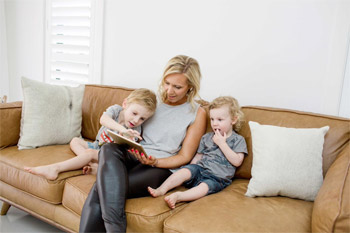Dr Kristy Goodwin Digital Parenting Report Interview

Dr Kristy Goodwin Digital Parenting Report Interview
nbn has released a Digital Parenting Report with findings including that increasingly, school book lists are being swapped for app lists and parents are embracing internet for education in the home.
nbn has been working with Children's Technology and Brain Researcher Dr Kristy Goodwin on the findings of the report, who claims, 'Parents should avoid feeling the -techno-guilt' that comes with monitoring screen time and try to understand what content their kids are consuming online instead of focusing less on how many hours they are spending on it. Access to fast and reliable broadband via the nbn network is key in enabling our children to take advantage of online tools such as video tutorials and podcasts which are proven to encourage creativity and help prepare our children for the digital workforce. It will also help to ensure children's screen-time can be maximised and isn't wasted due to buffering or digital distractions."
Head to YouTube to view the video of a family who is connected to the nbn and learning at home.
Interview with Dr Kristy Goodwin
Question: How is broadband set to flip lounge rooms in to classrooms in 2016?
Dr Kristy Goodwin: The flipped classroom is a term commonly used to describe a reversal of traditional teaching methods. Students research and learn from home (usually via online tutorials, videos, lectures etc) and bring key learnings into the classroom with them for discussion and interactive lesson plans.
Increasingly adopted across schools across the country as access to high speed broadband becomes more readily available, teachers and education experts agree the introduction of touch screens, tablets and interactive technology will reduce the amount of teacher talk and -flip' the traditional concept of learning.
We are likely to see this learning style more broadly adopted in 2016 and beyond as the country gains access to fast broadband thanks to the rollout of the nbn network.
Question: What is techno-guilt?
Dr Kristy Goodwin: Techno-guilt is where parents feel guilty for letting their children spend too much time using technology. As parents, who spent more time staring at the sky, than at screens, it's only natural that we fret about our kids' screen-time. Their digitalised childhood is completely different to our analogue childhood.
Question: And, why do you believe parents should avoid techno-guilt?
We need to leverage their online time to ensure that it supports their learning and development. This way, we can feel confident knowing that their online time is beneficial (and not just idle hours spent in front of screens).
Screen-time limits are important, but not the most critical factor to address when your child's online. Instead, I believe parents should focus on what their child is doing when they're online and ensure that this time is maximised by providing access to efficient and reliable Internet.
 Question: Why is it no longer necessary to worry about monitoring screen time?
Question: Why is it no longer necessary to worry about monitoring screen time? Dr Kristy Goodwin: As a children's technology and learning expert (and a mum!), let me assure you that the research confirms that when technology's carefully selected and used in intentional ways, there are educational benefits. So we can all breathe a sigh of relief.
Question: What is the -digital zombie effect'?
Dr Kristy Goodwin: This is where children are using -passive technology' such as watching TV which may not stimulate their brain.
Question: How can we prevent the -digital zombie effect'?
Dr Kristy Goodwin: Ask your child about what they're doing, creating and communicating online; encourage your child to create digital content (such as multimedia slideshows, digital books, podcasts, or videos) in addition to consuming digital content (for example watching You Tube content, or downloading games).
Question: How is the nbn network increasing children's productivity?
Dr Kristy Goodwin: Services delivered over the nbn™ network have the potential to significantly extend the reach, availability, and quality of education services for all Australians, whether that be young students at school, university students or life-long learners.
These services could help increase Australian's digital literacy and productivity, giving our students the necessary skills to operate in a global workforce and economy, as well as providing access to a world of new information, expertise and resources for all Australians.
It can also help our kids be more productive when they are using the Internet at home as fast broadband will reduce buffering times so forget waiting for the Youtube to download or assignment to upload.
Question: Can you talk about the learning tools on offer through the nbn network?
Dr Kristy Goodwin: Although simple functions like online research and reading can be done using existing networks, access to fast broadband will enable students to embrace multi-media at school (such as online video, film, music etc.) to prepare them for the future digital workforce.
The nbn™ network is designed to provide access to fast, reliable Internet services, enabling high bandwidth applications across these devices to run without constant dropouts. The nbn™ network will enable households with multiple students to access online videos, podcasts, apps and upload large files quickly and without constant buffering.
Question: Can you share your tips regarding parents helping kids using technology?
Dr Kristy Goodwin: Don't obsess about quantifying your child's screen-time - screen-time limits are important, but not the most critical factor to address how your child uses technology. Instead, focus on what your child's doing when they're online and ensure that this time is maximised by providing access to efficient and reliable broadband;
Use technology with your child where possible – research confirms that co-viewing has educational benefits, whether you're streaming TV or playing video games together. So help your child can really learn in the loungeroom by being present and interacting with them;
Prevent the -digital zombie effect' – ask your child about what they're doing, creating and communicating online; encourage your child to create digital content (such as multimedia slideshows, digital books, podcasts, or videos) in addition to consuming digital content (for example watching You Tube content, or downloading games);
Parents can learn too – kids love teaching their parents! Remember your child might have more technical knowledge and skills than you do, but they don't have the life skills and knowledge that you'll necessarily have so work with them and learn from each other.
Interview by Brooke Hunter
MORE



